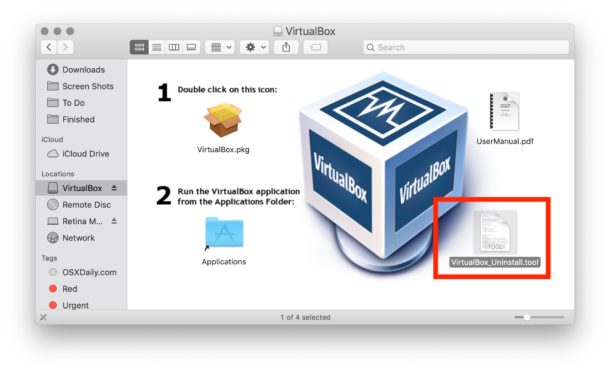How to Uninstall VirtualBox on Mac
![]()
If you have previously installed VirtualBox on the Mac but no longer need the application, you may be interested in uninstalling VirtualBox completely. Because VirtualBox places application components and dependencies throughout the MacOS file system, uninstalling VirtualBox thoroughly is not just a simple matter of dragging and dropping the application into the Trash, like how you can uninstall most other Mac apps.
Fortunately uninstalling VirtualBox is really quite easy, and the whole uninstall process can be automated and complete in short order on a Mac. We’ll also show you how to manually uninstall VirtualBox, which is quite a bit more involved, if you’re interested in that approach.
For some quick background for the unfamiliar, VirtualBox is an excellent free virtualization application available from Oracle, used by many advanced users for virtualizing other operating systems atop MacOS, like Windows 10 or Ubuntu Linux. It’s also cross-platform compatible, so you can likewise run MacOS, Windows, or Linux, on top of another Windows, Linux, or Mac. You can read tips about VirtualBox here, or browse our archives on virtual machines if interested. Anyway, this article is about completely uninstalling the VirtualBox app.
Most Linux users can uninstall VirtualBox easily with a simple command line string like so:
sudo apt-get purge virtualbox*
But on the Mac, VirtualBox is usually installed through a package installer. Fortunately Oracle provides an uninstall script on the install dmg, though most users overlook this.
How to Uninstall VirtualBox Completely from Mac the Easy Way
- Download the latest VirtualBox installer file from Oracle if you don’t have it already on your Mac
- Mount the VirtualBox disk image file and open that mounted dmg in the Finder
- Double-click on the text file named “VirtualBox_Uninstall.tool” to launch into a new Terminal window
- Confirm that you wish to completely uninstall VirtualBox by typing ‘yes’ when requested (you can cancel by typing ‘no’ or closing the Terminal window)


When VirtualBox and all related components and kernel extensions has been removed successfully, you can close the Terminal window or quit out of Terminal app as needed.
Manually Uninstalling VirtualBox from a Mac: Locations of All Related Files, Directories, etc
If you prefer to be hands-on, you can also manually uninstall VirtualBox by parsing through “VirtualBox_Uninstall.tool ” to find the exact file paths or all VirtualBox directories, components, the application, bins, launch daemons, kernel extensions, and more. You will want to do this manually using the version of the installer that you installed VirtualBox with so that you don’t miss anything.
As of the time of this writing, the current VirtualBox app and associated file path list is as follows:
~/Library/LaunchAgents/org.virtualbox.vboxwebsrv.plist
/usr/local/bin/VirtualBox
/usr/local/bin/VBoxManage
/usr/local/bin/VBoxVRDP
/usr/local/bin/VBoxHeadless
/usr/local/bin/vboxwebsrv
/usr/local/bin/VBoxBugReport
/usr/local/bin/VBoxBalloonCtrl
/usr/local/bin/VBoxAutostart
/usr/local/bin/VBoxDTrace
/usr/local/bin/vbox-img
/Library/LaunchDaemons/org.virtualbox.startup.plist
/Library/Python/2.7/site-packages/vboxapi/VirtualBox_constants.py
/Library/Python/2.7/site-packages/vboxapi/VirtualBox_constants.pyc
/Library/Python/2.7/site-packages/vboxapi/__init__.py
/Library/Python/2.7/site-packages/vboxapi/__init__.pyc
/Library/Python/2.7/site-packages/vboxapi-1.0-py2.7.egg-info
/Library/Application Support/VirtualBox/LaunchDaemons/
/Library/Application Support/VirtualBox/VBoxDrv.kext/
/Library/Application Support/VirtualBox/VBoxUSB.kext/
/Library/Application Support/VirtualBox/VBoxNetFlt.kext/
/Library/Application Support/VirtualBox/VBoxNetAdp.kext/
/Applications/VirtualBox.app/
/Library/Python/2.7/site-packages/vboxapi/
org.virtualbox.kext.VBoxUSB
org.virtualbox.kext.VBoxNetFlt
org.virtualbox.kext.VBoxNetAdp
org.virtualbox.kext.VBoxDrv
org.virtualbox.pkg.vboxkexts
org.virtualbox.pkg.virtualbox
org.virtualbox.pkg.virtualboxcli
Targeting those files and directories one by one for removal is probably easiest through the Terminal, but you could certainly do through the Finder if desired.
Obviously if you uninstall and remove VirtualBox, it won’t be on the Mac anymore, but you can reinstall it again at any point in the future if needed.


I uninstalled VirtualBox using “VirtualBox_Uninstall.tool”, and this worked well. However, I am left with a number of files (vdi, vbox, vbox-prev, VBox.log) that add up to over 100 GB. I think that these are the Virtual Machine files?
I found the guide to removing Virtual Machine Files using VirtualBox, but as I have removed VirtualBox I am not sure how to delete the VM and associated files completely. Any suggestions?
The thing I don’t like about downloading the virtualbox removal script is the script asks you to enter your computer’s password into the script. Hate that.
I get this message ““VirtualBox_Uninstall.tool” cannot be opened because it is from an unidentified developer.” So I cannot complete the task :-(
Right click on it again and choose Open with. Then choose Terminal. The message will show up again but this time it will give you the option to “Open”.
it’s asking me the password but I can’t write it. It’s putting a key logo. but when I’m writing the password nothing seemed to be written. can you help me ?
Thx in advance!
When you type your password in the terminal you can’t see it, but you actually are typing it. If you type it like normal as if you could see it then press enter, it should work.
Thanks work perfect! is very important enter to preferences next security to unblock install and unistall!
You can also use AppCleaner, who does a great job at tracking all the files and folders an newly-installed application disseminates all over your machine.
AppCleaner will find them all, and let you keep whatever you want to keep (for example, you may want to uninstall Dropbox, but keep the folder where you used to put your files for cloud-sync). AppCleaner can even uninstall system apps, at your own risk…
I’ve tried AppCleaner and it removed only a part of VirtualBox files but didn’t touch any of the LaunchAgents .plist files and binaries. So I think their uninstall script is the best solution in this case.